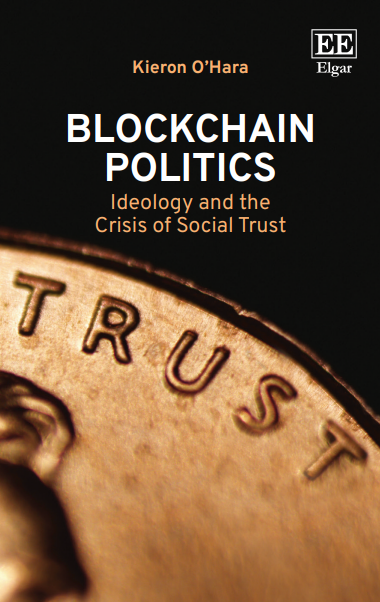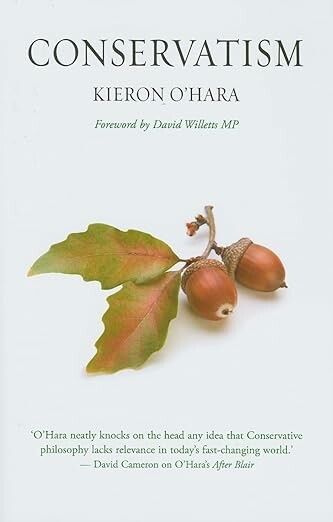Conservatism
 Books relating to Conservatism
Books relating to Conservatism
Blockchain Politics

Likening contemporary extremes of far-right populism and identity politics to 17th century Peasants and Puritans, Blockchain Politics examines the enduring importance of trust in political life. Kieron O’Hara develops a new theory of trust to analyse how these extremes undermine social accord and weaken representative democracy, and to suggest remedies.
Conservatism

The real meaning of ‘conservative’ – today denoting groups as diverse and incompatible as the religious right, libertarian free-marketeers and free-spending neo-conservatives – has been lost to politics. Yet the original conservative ideology, first developed in the eighteenth century by Edmund Burke, was concerned with managing change. Kieron O’Hara argues that genuine conservatism has its own relevance in a complex and dynamic world where change is rapid, pervasive and dislocating. Conservatism transcends traditional politics, and has surprising applications – not least as the most appropriate and practical response to climate change.
After Blair

In David Cameron’s review of the first edition of this book, he praised its ‘road map for a sustained Conservative recovery’ and is now following its prescription, leading to a successful Tory revival. Revised and significantly expanded this is the first book to consider Cameron and the Tories’ future. Calling the first edition ‘a compelling, and often persuasive read’, David Cameron’s detailed review of “After Blair” has been held up by the “Guardian” as the best description of his policies yet. His strong association with the book continued when he referred to it in his famous Keith Joseph lecture last spring. In this revised and expanded edition, O’Hara places Cameron in the context of Conservative history, explaining Cameron’s intellectual and political roots in a way that no other book has. Including new, exclusive interviews with Cameron’s principal advisors and strategists, a summary of the threat from the right to the Tories’ new direction, and an analysis of Cameron’s potential, this is the essential book on British politics today.
After Blair

Sets out a philosophy of conservatism that is adaptable for the post-New Labour, post-Thatcher era, based on Edmund Burke and Michael Oakeshott, and scepticism about the ability of rationalist social engineers to achieve their stated aims without risky unintended consequences. It boils conservatism down to two principles: the knowledge principle, that society is too complex and dynamic to model with any confidence; and the change principle, that rationalist thought persistently undervalues existing institutions and practices, and overvalues abstract and potential schemes, so that change always carries a risk.
 Articles relating to Conservatism
Articles relating to Conservatism
Blockchain Politics: Abstract and Analytic Table of Contents
2026
Themes: Conservatism, Extremism, Trust
Category: Extended abstract, Open access
Privacy and digital modernity: liberal and conservative approaches to technology, personalisation and the individual
Martin Beckstein & David McGrogan (eds.), The Conservative Critique of Liberalism, 89-124
2026
Themes: Conservatism, Digital modernity, Privacy
Category: Book chapter, Peer reviewed
Read the articleBurkean conservatism, legibility and populism
Journal of Political Ideologies, 26(1), 81-100
2020
Themes: Conservatism, Politics
Category: Journal article, Open access, Peer reviewed
Links have sometimes been drawn between conservatism and populism, but the radical nature of the latter, focused on change as a direct end, means that they cannot be connected so easily. This article argues that nevertheless, conservative thinking of the Burkean tradition can be used to understand, and possibly address, populist concerns. This is not because conservatism is biased towards the status quo – the conservative argues, on the contrary, that innovators, whether rationalist or populist, undervalue the status quo, and are therefore biased against it. Rather, the conservative values the legibility of a person’s society or culture to that person, and diagnoses many populist grievances as resulting from innovation making society less legible to the individuals within it.
Read the article Download the articleData-driven government: the triumph of Thatcherism or the revenge of society?
Antony Mullen, Stephen Farrall & David Jeffery (eds), Thatcherism in the 21st Century: The Social and Cultural Legacy, 55-73
2020
Themes: Conservatism, Digital modernity
Category: Book chapter, Peer reviewed
Margaret Thatcher’s statement that ‘there is no such thing as society’ has overshadowed Conservative Party politics since the 1980s, and has been the subject of exegesis and attempts at repudiation ever since. This chapter considers the statement in the context of Angus Maude’s critique of ‘society’ as a statistical abstraction, which comes, erroneously, to be taken as an agent in its own right, able to take on the responsibilities of individuals to their communities and ‘little platoons’, and ultimately to become the end of policy itself. This digital modernity, nascent in Maude’s and Thatcher’s day, is becoming increasingly influential, thanks to data-based policy and data-driven agency. The chapter argues that Maude’s subtler analysis still yields a conservative critique of digital modernity, whereas the less nuanced neoliberal individualism valorised by Thatcher may be seen as one of its enablers.
Read the articleThe conservative reaction to data-driven agency
Mireille Hildebrandt & Kieron O'Hara (eds.), Life and the Law in the Era of Data-Driven Agency, 175-193
2020
Co-authors: Mark Garnett
Themes: Conservatism, Digital modernity
Category: Book chapter, Peer reviewed
Political issues pertaining to data-driven agency and the use of ‘big data’ to make decisions about people’s lives are usually seen through the lens of liberalism. A conservative examination of data-driven agency requires a different lens. This chapter adopts the perspective of evolving modernity. It considers the philosophy of three major conservative thinkers, Edmund Burke, Alexis de Tocqueville and Michael Oakeshott, in the context of the problematisation of big data contained in Mireille Hildebrandt’s Smart Technologies and the End(s) of Law. Present-day conservatives need to rethink their traditional antipathy to the state, reverting to a Burkean understanding of the public-private distinction, and also to revise views of individual agency in the face of the facilitation of collective agency by networked digital technology.
Read the articleConservatism then and now: review of Scruton, Conservatism
Cosmos + Taxis, 6(3-4), 45-51
2019
Themes: Conservatism
Category: Book review, Peer reviewed
A review of Roger Scruton’s Conservatism: An Invitation to the Great Tradition, arguing that while Scruton’s historical discussion is illuminating, situating conservatism in dialogue with liberalism, his agenda for taking conservatism forward, involving a focus on political correctness and religious extremism, is very limited, not only ignoring a number of other very serious political issues, but also failing to speak to the concerns of non-conservatives.
Read the article Download the articleMargaret Thatcher (1925-2013)
Mark Garnett (ed.), Conservative Moments: Reading Conservative Texts, London: Bloomsbury, 127-136
2018
Themes: Conservatism, Conservative Party
Category: Book chapter, Open access, Peer reviewed
This chapter explores three questions. First, what is the nature of Thatcher’s political philosophy, and in particular the uncompromising statement that ‘there is no such thing as society’? Second, can we judge whether her policies in office were consistent with a tenable understanding of conservatism? Third, can we trace some of the antecedents of her thinking, and place her, tentatively at least, within a tradition?
Read the article Download the articleConservatism, epistemology, and value
The Monist, 99(4), 423-440
2017
Themes: Conservatism
Category: Journal article, Peer reviewed
A series of recent papers has discussed whether conservatism has a distinct set of values (substantive), or whether it consists in an attitude to shared values (adjectival). This paper argues that adjectival conservatism is a genuine type of conservatism, consistent with the Burkean tradition, in accordance with the idea that conservatism is concerned with change, and arguable using public reason. A version of adjectival conservatism derived from epistemological scepticism, consisting of a knowledge principle and a change principle, is presented. It is shown to (a) be resistant to arguments that adjectival conservatism is not a genuine type of conservatism, and (b) contain a distinct ideological programme, and not be restricted to a mere commentary on the activities of other ideologues.
Read the articleReview of Honderich, Conservatism
Contemporary Political Theory, 5(3), 354-358
2006
Themes: Conservatism
Category: Book review, Open access
Review of Ted Honderich, Conservatism: Burke, Nozick, Bush, Blair?
Read the article Download the article Talks relating to Conservatism
Talks relating to Conservatism
Can Conservatism Survive the 21st Century
Academy of Ideas, London
December 6th, 2011
Themes: Conservatism
Category: Panel
Watch Kieron O'Hara
Kieron O'Hara